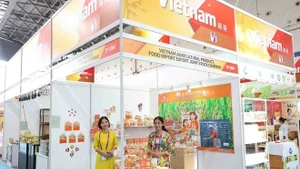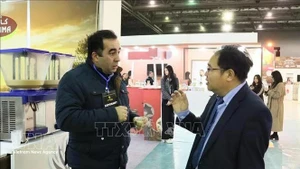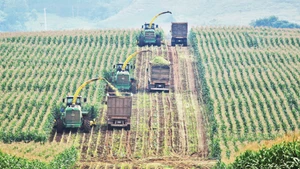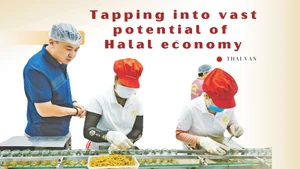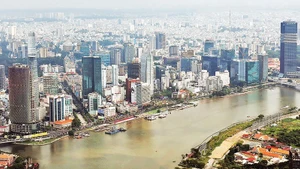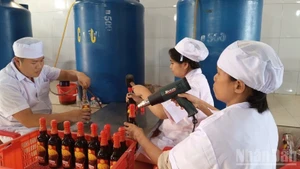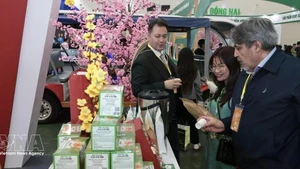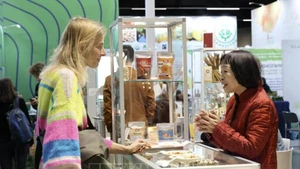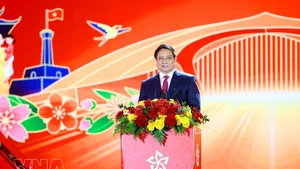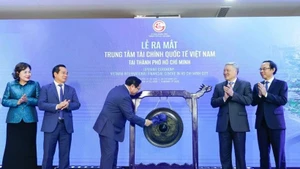Opportunities from new policies
At the specialised seminar “Mechanical and Electrical Supporting Industries for the Urban Railway Sector”, organised recently by the Ho Chi Minh City Investment and Trade Promotion Centre (ITPC) in collaboration with the Ho Chi Minh City Mechanical–Electrical Enterprise Association (HAMEE), many participants agreed that the special mechanisms approved by the National Assembly under Resolution No. 188/2025/QH15 (19 February 2025) on piloting several special mechanisms and policies for the development of urban railway networks in Ha Noi and Ho Chi Minh City, which will serve as a major boost enabling domestic enterprises to participate more extensively in metro project supply chains.
Nguyen Vinh Toan, Deputy Director of the municipal Department of Construction, noted that the national and urban railway networks in the city’s gateway region have been approved, comprising 27 routes with a total length of more than 1,000 km. Among them, Metro Line 2 (Ben Thanh–Tham Luong), expected to commence construction by the end of 2025, will open opportunities for cooperation in manufacturing and supplying equipment for many domestic enterprises.
The special mechanisms allow investment procedures to be shortened by 3–5 years compared with previous timelines, including the application of EPC contractor appointment and the separation of resettlement projects. As a result, Vietnamese enterprises will have more favourable conditions to provide products and technical services that they already have the capacity to deliver domestically.
According to Bui Anh Huan, Deputy Head of the Ho Chi Minh City Management Authority for Urban Railways, this policy foundation will help Vietnamese mechanical–electrical firms move closer to becoming key suppliers. Several major domestic groups such as Thaco, Sovico, and Vingroup are also exploring investment opportunities regarding urban railways, particularly Metro Lines 2 and 4 and the Thu Thiem–Long Thanh line.
The participation of private-sector investors is expected to generate strong spillover effects for the supporting industry, especially in mechanical engineering, electrical–electronic manufacturing, and advanced materials.

Tran Thanh Trong, Vice Chairman of the Ho Chi Minh City Mechanical–Electrical Enterprise Association, said domestic firms are now capable of handling auxiliary systems for urban railways such as power supply, ventilation, automated control, fire prevention and fighting, lifts, and backup generators. However, to master more complex equipment such as rolling stock, rails, and signalling systems, businesses must invest further in technology and strengthen linkages within the production chain.
According to Trong, Resolution No. 188/2025/QH15, which requires general contractors and subcontractors to prioritise goods and services that can be produced domestically, will create major opportunities for Vietnamese enterprises to expand their market share and gradually affirm localised capabilities in large-scale transport projects.
Trade connectivity - Driving the value chain
Alongside supportive policies, trade promotion activities are also being prioritised by the city. The 2025 Week for Trade Connectivity and Product Showcase in Mechanical Engineering, Electrical Engineering and Digital Technology, jointly organised recently by ITPC and HAMEE, attracted dozens of domestic and international businesses. The event featured a wide range of advanced technologies and solutions in mechanical engineering, electrical systems, automation, and digital transformation in manufacturing.
Amid the city’s acceleration of metro projects and large-scale urban railway planning, the mechanical–electrical sector is facing a rare window of opportunity to develop supporting industries. The trade connectivity week was not only an occasion for companies to present new technologies but also a strategic step towards deepening integration and moving towards mastering global supply chains.
Do Phuoc Tong, Chairman of the Ho Chi Minh City Mechanical–Electrical Enterprise Association, noted that the event is one of the city’s key promotional activities aimed at strengthening linkages among enterprises in mechanical engineering, electrical engineering, and digital technology, foundational sectors of modern industry.
The event helps Vietnamese firms integrate more deeply into production value chains and connect with major infrastructure projects, thereby strengthening the position of “Made in Viet Nam” and “Made by Viet Nam” products.

Alongside trade promotion, the city is also intensifying digital transformation in enterprises, applying new technologies towards green production and green exports. The city has issued a range of policies to support businesses in technological innovation, productivity enhancement, quality improvement, and increasing localisation rates.
Ho Thi Quyen, Deputy Director of the Ho Chi Minh City Investment and Trade Promotion Centre, said that as the country’s economic locomotive, the city is proactively pursuing international integration, developing the green economy and circular economy, and resolving difficulties for enterprises to help restore production and enhance competitiveness. The mechanical sector currently plays a pivotal role in the economy, supplying materials and equipment to various industries such as construction, automotive, electronics, energy, and aviation.
According to the Ministry of Industry and Trade, Viet Nam is home to more than 3,100 mechanical–manufacturing enterprises with 53,000 production facilities, accounting for nearly 30% of all processing and manufacturing businesses nationwide. Many of these enterprises have already joined the global supply chains of major industrial producers such as Toyota, Hyundai, and Samsung.






